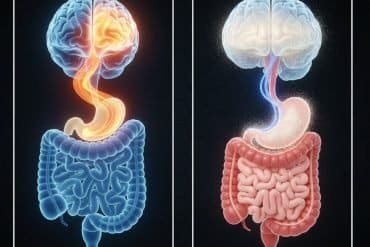Summary: Twice daily vitamin D supplementation reduces symptoms of vertigo for those suffering BPPV.
Source: AAN
Taking vitamin D and calcium twice a day may reduce your chances of getting vertigo again, according to a study published in the August 5, 2020, online issue of Neurology.
“Our study suggests that for people with benign paroxysmal positional vertigo, taking a supplement of vitamin D and calcium is a simple, low-risk way to prevent vertigo from recurring,” said Ji-Soo Kim, M.D., Ph.D., of Seoul National University College of Medicine in Korea. “It is especially effective if you have low vitamin D levels to begin with.”
Benign paroxysmal positional vertigo happens when a change in head position gives you a sudden spinning sensation. It’s one of the most common types of vertigo. Treatment includes a doctor performing a series of head movements that shift particles in the ears that cause the vertigo, but the condition tends to recur frequently. About 86% of people with this form of vertigo find that it interrupts their daily life or causes them to miss days at work.
The study looked at 957 people in Korea with benign paroxysmal positional vertigo who were treated successfully with the head movements. The participants were separated into two groups, intervention and observation.
The 445 people in the intervention group had their vitamin D levels taken at the start of the study. The 348 people with vitamin D levels below 20 nanograms per milliliter (ng/mL) were started on supplements with 400 international units of vitamin D and 500 milligrams of calcium twice daily, while those with vitamin D levels equal to or greater than 20 ng/mL were not given supplements.
The 512 people in the observation group did not have their vitamin D levels monitored and they did not get supplements.
Those in the intervention group who took the supplements had a lower recurrence rate for vertigo episodes after an average of one year than those in the observation group. People taking supplements had an average recurrence rate of 0.83 times per person-year, compared to 1.10 times per person-year for those in the observation group, or a 24% reduction in the annual recurrence rate.

There appeared to be greater benefit for those who were more deficient in vitamin D at the start of the study. Those who started with vitamin D levels lower than 10 ng/mL saw a 45% reduction in annual recurrence rate, while those starting with vitamin D levels at 10 to 20 ng/mL saw only a 14% reduction. A total of 38% of the people in the interventional group had another episode of vertigo, compared to 47% of those in the observation group.
“Our results are exciting because so far, going to the doctor to have them perform head movements has been the main way we treat benign paroxysmal positional vertigo,” said Kim. “Our study suggests an inexpensive, low-risk treatment like vitamin D and calcium tablets may be effective at preventing this common, and commonly recurring, disorder.”
A limitation of the study is that a large number of participants did not complete the entire study, with more people assigned to take the supplements dropping out of the study than in the observation group.
Funding: This study was supported by the Korean Ministry of Health and Welfare.
About this neurology research article
Source:
AAN
Contacts:
Press Office – AAN
Image Source:
The image is in the public domain.
Original Research: Closed access
“Prevention of Benign Paroxysmal Positional Vertigo with Vit D Supplementation: A Randomized Trial” by Seong-Hae Jeong, Ji-Soo Kim, Hyo-Jung Kim, Jeong-Yoon Choi, Ja-Won Koo, Kwang-Dong Choi, Ji-Yun Park, Seung-Han Lee, Seo-Young Choi, Sun-Young Oh, Tae-Ho Yang, Jae Han Park, Ileok Jung, Soyeon Ahn, Sooyeon Kim. Neurology.
Abstract
Prevention of Benign Paroxysmal Positional Vertigo with Vit D Supplementation: A Randomized Trial
Objective
To assess the effect of vitamin D and calcium supplementation in preventing recurrences of benign paroxysmal positional vertigo (BPPV).
Methods
We performed an investigator-initiated, blinded-outcome-assessor, parallel, multicenter, randomized controlled trial in 8 hospitals between December 2013 and May 2017. Patients with confirmed BPPV were randomly assigned to the intervention (n=518) or the observation (n=532) group after a successful treatment with canalith repositioning maneuvers. The primary outcome was the annual recurrence rate (ARR). Patients in the intervention group had taken vitamin D 400 IU and 500 mg of calcium carbonate twice a day for one year when serum vitamin D level was lower than 20 ng/ml. Patients in the observation group were assigned to follow-ups without further vitamin D evaluation or supplementation.
Results
The intervention group showed a reduction in the ARR [0.83 (95% CI: 0.74-0.92) vs. 1.10 (95% CI: 1.00-1.19) recurrences per one-person year] with an incidence rate ratio of 0.76 (95% CI: 0.66-0.87, p<0.001) and an absolute rate ratio of -0.27 (-0.40 to -0.14) from intention to treat analysis. The number needed to treat was 3.70 (95% CI: 2.50-7.14). The proportion of patients with recurrence was also lower in the intervention than in the observation group (37.8 vs. 46.7%, p=0.005).
Conclusions
Supplementation of vitamin D and calcium may be considered in patients with frequent attacks of BPPV, especially when serum vitamin D is subnormal.
Classification of Evidence:
This study provides Class III evidence that for patients with BPPV, vitamin D and calcium supplementation reduces recurrences of BPPV.







